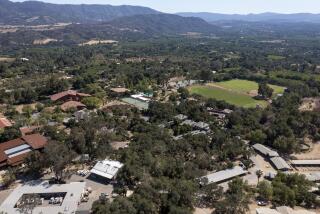Key to His Schools’ Success? It’s God, Founder Says
- Share via
ST. GEORGE, Utah — Robert Browning Lichfield opened his first “tough-love” academy at a time when he was so financially strapped that he, his wife and four children lived crowded together in a one-room apartment.
In the ensuing 16 years, Lichfield had three more children, added 10 schools to his investment portfolio and founded a business empire whose holdings include everything from restaurants to radio stations.
At 49, Lichfield cuts an unmistakable swath through this fast-growing southwestern Utah city. In achieving material success, he has also become something of a civic and political figure -- and a major contributor to the state’s Republican Party.
When asked about his success, and about the criticism surrounding the school network that he created, he makes reference to his fervent Mormon faith.
God is the key to his accomplishments, he says, and Satan is stirring up his foes.
“We’re here getting kids off drugs and other evils,” Lichfield said during a rare interview at the headquarters of the World Wide Assn. of Specialty Programs and Schools. “We’re here connecting kids with their families. We’re here getting kids in touch with their higher source.
“Do I believe, being a God-believing person, that the adversary to all good is going to sit back and let that happen without a major unleashing of dark forces? No, I don’t.”
Lichfield is a bearded man, with a burly physique and shy, congenial manner recalling John Candy, the late actor and comic. He wore an open-necked shirt and toyed with a business card during an interview with the Los Angeles Times -- a meeting he agreed to only after months of negotiation.
He requested his photograph not be published in The Times because “some kids are a little deranged.... You never know what they might do.”
Lichfield says his role in the for-profit schools is that of an investor and advisor, but his adversaries say he has a key role in managing them. Whatever the case, he usually leaves Ken Kay, the association’s white-haired president, to answer questions about the schools’ policies.
Lichfield’s role in politics is easier to pin down. According to Federal Elections Commission records, Lichfield and his wife gave the Republican Party $175,000 in a recent 12-month period, and he was named Republican of the Year this year by the Washington County GOP.
“As a person, he is great,” said county GOP Chairman Naghi Zeenati. “He is community-minded and always available to help.”
Lichfield got his first job with problem teens in 1977 when he was a “dorm parent” at a private boys’ school on a wooded lot north of Provo. At the fenced-in compound known as Provo Canyon School for Boys, students were subjected to tough treatment, including long periods of solitary confinement and forced lie-detector tests.
It was “baptism by fire,” said Lichfield, who has no formal qualifications in education or child psychology and didn’t graduate from college. On the job, he said, “you learn real fast, just as a [physician’s assistant] learns doctoring skills by working with doctors.”
However, not all of his charges from those days recall the fledgling educator with fondness. David Doran, 34, of Tarzana spent time in his youth at Provo Canyon and said he remembers Lichfield as a humorless, dictatorial figure who seemed to delight in taunting students.
About the same time, Lichfield founded the Cross Creek school, his first. In 1987, Lichfield signed a contract to run Brightway Adolescent Hospital in St. George, which health officials said quickly became a pipeline for enrolling students in tough-love schools.
State inspectors investigated the private psychiatric institution after receiving complaints of children being admitted without consent from both parents and a failure to report a suspected case of child abuse, Utah Department of Health spokeswoman Debra Wynkoop said. The hospital shut down in 1998 after being informed by state health officials that they were going to order its closure, Wynkoop said.
By the time WWASPS was created in 1998, Lichfield said he had let other people assume ownership and management of the schools. Ken Kay, president of WWASPS, declined a request from The Times to provide a list of the owners. But some affiliates are family members.
Lichfield’s younger brother Narvin owns Carolina Springs Academy near Abbeville, S.C., and the Academy at Dundee Ranch in Costa Rica. Kay’s son, Jay, runs the WWASPS school in Jamaica, called Tranquility Bay.
What Lichfield does own, he said, are many of the buildings and grounds that house the WWASPS schools. Title formally belongs to a legal entity with a name intentionally so long newspapers won’t print it, he joked. That entity, the Robert Browning Lichfield Limited Family Partnership, has Lichfield and his wife, Patricia, as sole partners, according to documents filed with the Utah secretary of state’s office in 1995. Lichfield said he co-owns other properties with business associates.
As for his role in WWASPS, on paper Lichfield is simply a trustee. Some adversaries contend that the limited designation is the way he protects himself from legal liability.
A thicket of interrelated, for-profit companies has grown up around the nonprofit WWASPS. They include Teen Help, the association’s marketing arm; Teen Escort Service, which convoys children to and from member schools; and R&B; Billing, which sends the monthly bills to parents and processes their payments.
Thomas Burton, an attorney in Pleasanton, Calif., who has sued WWASPS, its member schools and associated businesses at least seven times -- though he has yet to win a case -- contends that all of these entities function as a huge, single commercial venture with Lichfield at the heart.
“The corporations keep shifting and being reconstituted with different people in different places,” Burton said. “It seems they want to keep this a moving target.”
In March, the Northern California lawyer filed suit in federal court in Salt Lake City on behalf of a former student at Tranquility Bay, claiming the WWASPS school in Jamaica was a “steaming squalid jungle camp, infested with flies, mosquitoes, scorpions and vermin.”
After listening patiently during his interview with The Times to a recounting of these kinds of parent and student complaints, Lichfield spoke again of religious faith and his conviction that the methods he pioneered have aided many.
“God can’t help everybody. I don’t know how we’re going to,” he said. “But it [WWASPS] does provide an opportunity for thousands of kids to improve their lives. Those who choose not to, choose not to.”
More to Read
Sign up for Essential California
The most important California stories and recommendations in your inbox every morning.
You may occasionally receive promotional content from the Los Angeles Times.













